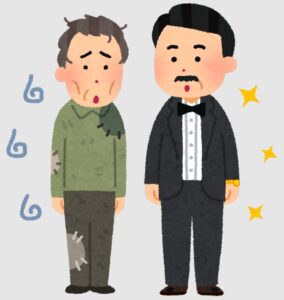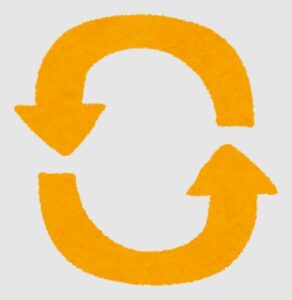管理人オススメコンテンツはこちら
「どれだけ価値を持たせられるか|その贅沢、未来を食ってないか?」
〜前回のつづき〜
●お小遣い調査から伝えたい事3つ(つづき)
(2)死に金を使うな
お小遣いが
2万円から3万円に増えるのと
10万円から11万円に増えるのとでは
嬉しさの大きさが
全然違う訳ですね。
前者の1万円というのは
大切に使われると
思うんですね。
「2万円から3万円に上がった!」
となったら
大事に使いますよね?
でも
10万円から11万円だと
ちょっと雑になっちゃう。
何となく
そんな感じがしませんか?
やはり同じ1万円でも
10万円から11万円になった時の方が
雑に扱われちゃうんですよ。
お小遣いが増えた分で
ギャンブルするというのは
その典型なんですね。
こういう傾向は
経済学的にも証明されています。
大事なのはお小遣いの
・多い
・少ない
じゃなくて
自分が使うお金に
どれだけ価値を持たせられるか
という事なんですよ。
他人と競争して
無理にお金を使ったりとか
お金があるから
大して欲しくないとか
必要の無いものを
買ってしまったりとか
CMとか雑誌の広告で
消費意欲を煽られて
ついつい買っちゃったりとか
こういう状態では
いくらお金が有っても
無駄な訳ですよ。
こういうお金の使い方では
そんなに高い満足度というのが
得られないんですよ。
やはりさっき言った
自分と向き合うというのが
大事なんですね。
(3)お小遣いよりも資産を増やせ
いくら頑張って
お小遣いを増やしたとしても
働くのをやめた時点で
お小遣いはストップですね。
そして
お小遣いが多くなっているほど
落差が大きくなっちゃう訳ですね。
なかなか人間って
生活水準の下落に
耐えられないんですよ。
特に普通の人って
生活水準の大きな下落というのに
耐えられないので
生活水準を落とすのが嫌で
仕事を辞められなくなっちゃったりとか
今の仕事がつまらなくても
転職出来なくなる。
「残業も多いし
今の仕事嫌いなんだけど
やっぱり
今の生活水準を落とすのが嫌で
仕事を辞められない。
だから副業から先に・・・」
という人がいるんですけど
私からすると
どうしても必要な消費であれば
しょうがないんですけど
そういう人達を
よくよく見ていくと
無駄な浪費だったりとか
生活水準というのが高くなってる人が
結構多いんですよね。
だからやっぱり
・自分の身体
・自分の人生
もっと大きな所から
見てほしいとは思うんですよ。
大事なのは
・貯める
・使う
このバランスなんですよ。
使うのがダメという事ではなく
貯めるばっかりでもダメ。
でも
・貯める
・使う
この2つのバランスなので
お小遣いを無くして
ひたすらお金を貯めろとは
言わないですけど
やっぱり優先的に
資産を貯めていった方が
どちらかと言えば
いいんじゃないかと思います。
その資産が生み出した
資産所得で遊ぶ分には
永続性が有る訳ですね。
〜〜〜つづく〜〜〜
Special Thanks college president Ryo.
●おまけ
≪≪perplexityちゃんによる文章まとめ≫≫
お小遣いが少し増えた時は大切に使う傾向がありますが、多く増えた場合は無駄遣いしやすくなります。
重要なのはお金の多さではなく、使うお金にどれだけ価値を感じられるかです。
他人の目や広告に流されて、必要ないものにお金を使うのは満足度が低く、無駄遣いと言えます。
また、お小遣いは働いている間しか得られず、仕事を辞めると途絶えます。生活水準を無理に上げると、その落差に耐えられず仕事を辞めにくくなるため注意が必要です。
貯蓄と消費のバランスが大切ですが、まずは資産を増やすことを優先しましょう。
資産所得からの収入は長続きし、経済的な余裕をもたらします。
つまり、お金は量よりも使い方の価値を意識し、無駄遣いを避けて資産形成を目指すことが大切です。
- https://www.nomura-am.co.jp/sodateru/start/parenting/cost/middleschool.html
- https://www.gov-online.go.jp/useful/article/201404/1.html
- https://prtimes.jp/main/html/rd/p/000000225.000013831.html
- https://www.nli-research.co.jp/report/detail/id=81461?site=nli
- https://www.navinavi-hoken.com/articles/professor-interview-shimizu
≪≪Chat-GPTくんによる英訳≫≫
~Continuation from Last Time~
【Three Key Takeaways from the Pocket Money Survey (continued)】
(2) Don’t Waste Your Money
There’s a big difference in how happy you feel when your pocket money increases from ¥20,000 to ¥30,000 compared to when it increases from ¥100,000 to ¥110,000.
That extra ¥10,000 in the first case tends to be used more carefully.
If your pocket money goes from ¥20,000 to ¥30,000, you probably treat that increase with more care, right?
But when it goes from ¥100,000 to ¥110,000, it tends to be treated more carelessly.
Doesn’t that just feel true?
Even though it’s the same ¥10,000, it’s more likely to be spent thoughtlessly in the latter case.
Spending the extra money on gambling is a classic example of wasted money.
This kind of behavior is even supported by economic theory.
The important thing isn’t whether your pocket money is:
a lot
or a little
What really matters is how much value you place on the money you spend.
If you:
Compete with others and force yourself to spend,
Buy things you don’t really want just because you have money,
Purchase unnecessary items,
Or get lured in by commercials and magazine ads and end up impulse-buying—
Then no matter how much money you have, it’s all being wasted.
That kind of spending doesn’t bring much satisfaction in the end.
So again, it’s important to reflect on yourself and how you use money.
(3) Build Assets, Not Just Allowances
No matter how hard you work to increase your pocket money, it stops the moment you stop working.
And the more your allowance has grown, the bigger the drop you’ll feel when it disappears.
It’s human nature—people really struggle to lower their standard of living.
Especially average people—they often can’t handle a big drop in lifestyle, so:
They become unable to quit their job even if they want to,
Or they can’t switch careers even if they’re unhappy,
You might hear people say:
> “I work too much overtime. I hate my job.
> But I can’t stand lowering my standard of living,
> So I just can’t quit.
> I’ll start a side hustle first…”
From my perspective, if the spending is truly necessary, then so be it.
But when I really take a close look at those people, many of them are simply wasting money or maintaining a needlessly high standard of living.
That’s why I want people to zoom out and look at:
Their body,
Their life,
From a bigger-picture perspective.
What truly matters is the balance between:
Saving
and Spending
Spending isn’t bad. But saving all the time isn’t right either.
It’s about finding the right balance.
I’m not saying you should cut out all your spending and just hoard money.
But I do think it’s wiser to prioritize building assets.
If you play with the income generated from your assets, that has sustainability.
—
Let me know if you’d like a more concise summary version in English too.
Special Thanks OpenAI and Perplexity AI, Inc








